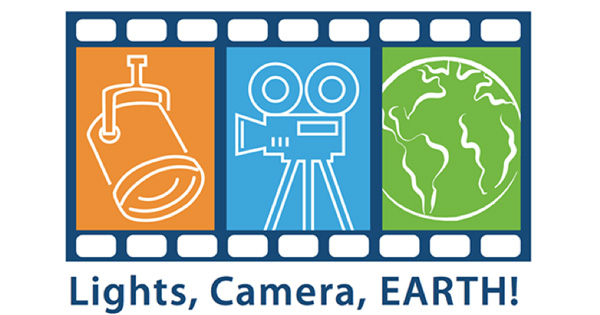


Lights, camera, earth!
Graphic by Christian Derr February 20, 2018
UD’s fifth annual environmental film series to focus on challenges facing our oceans and coasts
The Delaware Environmental Institute (DENIN) has partnered with the College of Earth, Ocean, and Environment and the University of Delaware Library, Museums and Press to present its fifth Lights, Camera, Earth! environmental film series, beginning Wednesday, Feb. 21, at 7 p.m. in the Trabant University Center Theater.
The series runs from Feb. 21 through March 21 and is open to the public at no cost.
"Each of the films in this year's series highlights a different challenge facing our oceans and marine life, and ultimately human civilization, which depends on the sea," said Beth Chajes, communications manager for the Delaware Environmental Institute and organizer of the film series. "And we are very excited to have some of the foremost experts in these areas from UD's School of Marine Science and Policy leading discussions with the audience after each film."
Topics addressed by the five films in the series include noise and plastic pollution, sea level rise, coral reef bleaching, ocean acidification, and overfishing.
All screenings will take place on Wednesdays at 7 p.m. in the Trabant Theater with the exception of the final film, Tidewater, which will be hosted by the College of Earth, Ocean, and Environment at the Main Street Movies 5 in the Newark Shopping Center.
The final film will conclude with a panel discussion featuring oceanography professor Chris Sommerfield, Delaware Sea Grant Marine Advisory Service specialist Danielle Swallow, and Lewes-based photographer Judy Rolfe, who was an assistant producer on the film. Reservations are required for the final screening due to limited seating and can be made via this link.
The scheduled films are as follows:
Feb. 21 – A Plastic Ocean
In the center of the Pacific Ocean, researchers find more plastic than plankton. This film documents the newest science that demonstrates how plastics, once they enter the oceans, break up into small particulates that enter the food chain where they attract toxins like a magnet. These toxins are stored in the fatty tissues of marine animals and eventually consumed by us. Discussion leader: Jonathan Cohan, associate professor, School of Marine Science and Policy.
Feb. 28 – The End of the Line
Advances in fishing technology mean whole species of wild fish are under threat of collapse. This film not only points out who is most to blame but advocates for sustainable consumption, for marine protected areas, and for a new ethic of responsible fishing. Discussion leader: Lee Anderson, professor emeritus, School of Marine Science and Policy.
March 7 – Chasing Coral
Coral reefs around the world are vanishing at an unprecedented rate. A team of divers, photographers, and scientists set out on a thrilling and arduous ocean adventure to discover why and to reveal the underwater mystery to the world. Discussion leader: Danielle Dixson, assistant professor, School of Marine Science and Policy.
March 14 – Sonic Sea and Acid Test
A double feature of two shorter films produced by the Natural Resources Defense Council that depict the sources and consequences of two invisible forms of marine pollution: noise and the falling pH of ocean waters resulting from the absorption of excess carbon dioxide. Discussion leader: Wei-Jun Cai, Mary A.S. Lighthipe Professor of Earth, Ocean and Environment.
March 21 – Tidewater (reservations required)
Hampton Roads, Virginia, is home to our highest concentration of military assets in the country, where one in six residents is associated with the military. Their homes, schools, hospitals, and families are increasingly struggling to keep up with the effects of rising waters. The military and the surrounding municipalities are working towards solutions. Panelists: Chris Sommerfield, professor, School of Marine Science and Policy; Danielle Swallow, Delaware Sea Grant Marine Advisory Service specialist; and Judy Rolfe, assistant producer on the film.
For more information, including running times and trailers, visit the film series webpage.
Contact Us
Have a UDaily story idea?
Contact us at ocm@udel.edu
Members of the press
Contact us at 302-831-NEWS or visit the Media Relations website

